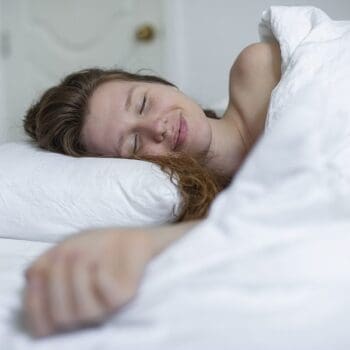 For context, the two of us are writing this in the afterglow of HITEC – the world’s biggest hotel technology tradeshow – where the sheer intensity of working from seven in the morning to making a rapid exit from a networking event at 11 in the evening prevented any semblance of a good night’s rest.
For context, the two of us are writing this in the afterglow of HITEC – the world’s biggest hotel technology tradeshow – where the sheer intensity of working from seven in the morning to making a rapid exit from a networking event at 11 in the evening prevented any semblance of a good night’s rest.
Indeed, the subject of sleep, or a lack thereof, was common amongst the attendees – all of us with very clear undereye bags by the end of five full days of nonstop meetings. And yet, even here amidst four solid hours of shuteye, what’s happening in the world of science-based sleep tech was not a foremost topic amongst exhibitors.
This is rife ground for hotel to gain traction because poor sleep while traveling affects nearly every hotel guest. And as we will explore later, some are also inclined to pay extra for some semblance of a guarantee that their sleep won’t be negatively impacted while on the road.
Why focus on the bed
We start by asking the simple question: given that the average person spends so much of their life laying on top of a mattress (whether sleeping or otherwise), shouldn’t we all prioritize how much we spend on said mattress in order to get the most out of our time?
While the design of a sleep-friendly guestroom can integrate many different features and amenities, we’re focusing specifically on the bed because of how fundamental the physical mattress is for everyone’s life and thus for the overall hotel experience. Just do the math: 7 hours average per day times 365 days per year times however long you’ve been alive and…you get the idea. Beyond examining the latest advancements in smart mattresses, our hope is that this article also inspires you to think more deeply about how you sleep in order to feel refreshed while traveling and at home.
To show you what’s possible and to explain the revenue opportunities for enhanced sleep systems at hotels, we interviewed Barry Van Doornewaard, Founder and CEO of FreshBed, the manufacturer of a proprietary sleep system with allergy-friendly functionality, active HEPA ventilation, thermoregulation and humidity controls built directly into the bed to profoundly improve the guestroom experience.
To give you some more context about the importance of staying up to date with bedding innovations, the provision of a good night’s sleep is nothing new. It is a core facet of hotel operations because, on a deeply emotional level, if a guest does not sleep well at your hotel they are unlikely to return, while your TripAdvisor score may also suffer.
Nor is the notion of upgrading a hotel’s guestroom beds a novel concept; just look back at the success of Westin’s Heavenly Bed program first introduced in 1999. More recently, sleep tourism has become its own thing wherein travelers specifically seek out hotels for their restorative sleep programs. Rosewood Hotels & Resorts has its Alchemy of Sleep experiences; Park Hyatt has debuted a ‘sleep suites’ product tier; Six Senses offers multi-night sleep wellness packages, Sonesta is rolling out its Rest & Renew Sleep Program brand-wide; and in this particular instance, FreshBed is the supplier for the recently opened RH Guesthouse in the West Village neighborhood of New York.
Given the craze over sleep tech of late, here are some converging factors to consider:
- Sleep science has gone mainstream, with plenty of recent research indicating just how critical good sleep is for bodily restoration, cognition, fat loss and the immune system
- Awareness for the benefits of sleep efficiency and high-quality sleep has also gone mainstream, with people of all walks of life now possessing a basic understanding of terms like deep sleep, REM, sleep hygiene, circadian rhythm and melatonin
- Fueling this mainstream awareness is the growth of the wellness and longevity industries, wherein the pursuit of good sleep is a foremost goal to aid in antiaging and overall wellbeing
- The pandemic threw a lot of people off their natural sleep cycles for various reasons, with many now prioritizing healthy sleep hygiene in this post-pandemic era of work-life balance while others are more conscious of air purification techniques used by hotel rooms
- Chasing the demand for quality sleep while traveling, many hotels beyond just the few mentioned above have already deployed upgraded sleep programs, turning this specific area into an arms race wherein only the cutting edge will now be effective at winning market share
To dwell on the last point about demand, the return on an investment in sleep programming can be broken down as follows:
- At the base level, ensuring that guests get the best sleep possible protects a hotel brand from guest churn and boosts loyalty
- A new sleep program can be used as part of a marketing campaign to increase product awareness and drive customer acquisition
- Given how meaningful quality sleep is for travelers nowadays, room upgrades in this direction can strongly justify increases in nightly rate, either across the board for all guestrooms or by carving out new sleep-friendly room categories that can be packaged, upsold and used in error recovery situations
- As a central pillar within the broader banner that is wellness, the introduction of an advanced sleep program can help a brand to pivot deeper into the wellness space in order to capitalize upon a series of alternate revenue streams in the future
How beds can improve sleep quality
We all know that old mattresses that sag in the middle or have lumps can negatively affect sleep by contorting the body into an uncomfortable position, thereby increasing the time it takes to fall asleep, causing interruptive wakefulness during sleep as the body reorients itself and perpetuating lower back pain. But another aspect influencing sleep quality that isn’t as widely understood is the bed microclimate created from the body’s heat between the sheets, the comforter and the mattress.
To explain the issue of room ambient temperature versus the microclimate formed between the sheets and the mattress, Van Doornewaard commented, “From a recent study, the European Bedding Industry Association found that the second biggest sleep disorder (52%) is having an improper bed climate, which is most likely to occur when body heat gets trapped by high-thread-count-linens, excess room humidity, plastic covers that prevent ventilation out the sides of mattresses or others. In these cases, as the temperature increases around the sleeper throughout the night, it can lead to restless leg syndrome, perspiration, conscious or unconscious wakeups and poorer recovery.”
“From scientific research, we now know that the ideal bedroom climate for recovery should be relatively cold (between 18C and 22C) and dry (around 50% relative humidity),” continued Van Doornewaard. “FreshBed allow guests to personalize and optimize the microclimate under the duvet so that temperature or moisture levels never become disruptive in the middle of the night and can improve sleep by up to 50%, while the delivery of HEPA-purified air further enhances sleep quality.”
One other critical property of moisture is that water residues allow microbes and dust mites (or even bedbugs!) to flourish on pillows, comforters, duvets and mattresses. This then impacts air quality – and potentially introduces allergens into the environment – around the bed to further weaken sleep. Over the long-term, moisture also hastens the deterioration of the mattress.
Given the positive correlation between enhanced climate control and sleep quality, installing a smart thermostat in the room would be a worthwhile first step to bring the guestroom to a cooler, optimal temperature for sleep (and also helping reduce energy costs when the room is unoccupied). But ambient temperature doesn’t necessarily help modulate the bed microclimate under all those linens and a thick duvet. More site-specific controls within the bed are needed to successfully market a guarantee of improved sleep to guests.
This precision is what elevates manufacturers like FreshBed from mere beds into sleep systems that can elevate the hotel experience and allow hotels to significantly charge more for that guarantee. Whether linked to the smart thermostat or through another connected hotel app (or in-room tablet), guests can set their own bed temperatures while the silent air purification filters capture microbes and curtail humidity, all to dramatically improve sleep quality and provide more peace of mind to travelers who may not sleep well while abroad. Then, as an added bonus for the hotel, the reduced moisture levels increases the lifespan of the mattress to lower the long-term replacement costs.
Luxury travelers prioritize sleep
There’s a reason why luxury hotel brands like some of the ones previously mentioned are starting with the mattress. Yes, contemporary sleep systems come with a higher unit cost, but the argument in favor of implementation always comes back to how central the bed is for guest satisfaction.
You can throw all the bells and whistles at a guest – fancy furnishings, great views, gargantuan room sizes, exquisite F&B, a world-class spa and so on – but everyone sleeps in roughly the same space, and if this experience isn’t perceived as restorative then the guest isn’t likely to come back.
In this sense, the rise of sleep tourism speaks to a broader change in the mindset of the luxury traveler; it’s less about wealth and demography, and more about lifestyle and identity regardless of age or cultural background. For instance, van Doornewaard pointed out that the promotion of FreshBed installations at the RH Guesthouse became an instrumental support for the launch campaign into the crowded market that is New York City as well as for justifying the hotel’s $2,200-plus nightly rates.
While the benefits of good sleep are becoming more commonplace, this information is still unevenly distributed, with the luxury traveler more sensitive to its importance. For instance, just think of the risks of getting a bad night’s rest for a high earner like a stockbroker or a neurosurgeon. For the financier who relies on as little as a 1% edge over the market, any temporary cognitive drain can cost them immensely, while for the doctor it’s potentially a matter of life or death.
For these reasons and many others, the guarantee of getting a proper sleep while traveling is something that people are willing to pay for, and it is an aspect of the guestroom experience that customers are now specifically looking for when selecting their hotels. The pursuit of the best sleep and the bed possible is an arms race that will inevitably seep through all hotels in all market segments, so best to get ahead of the curve while you still can.
This article may not be reproduced without the expressed permission of the author.















